* You are viewing Posts Tagged ‘History of Science’
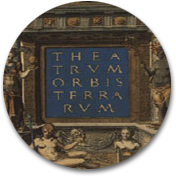 Further to the CFP (which is now closed), full details are now available for the conference The Global Dimensions of European Knowledge, 1450-1700, which will take place at Birkbeck, University of London on 24–25 June 2011. The conference will investigate the impact of European exploration and travel on the structures, contents and sources of authority of European knowledge c.1450-1700, seeking to explore connections between the making of knowledge and a broad range of intellectual, political, cultural, religious and mercantile encounters between Europe and the wider world. For keynotes, panels, abstracts, and speaker biographies, please visit the conference website.
Further to the CFP (which is now closed), full details are now available for the conference The Global Dimensions of European Knowledge, 1450-1700, which will take place at Birkbeck, University of London on 24–25 June 2011. The conference will investigate the impact of European exploration and travel on the structures, contents and sources of authority of European knowledge c.1450-1700, seeking to explore connections between the making of knowledge and a broad range of intellectual, political, cultural, religious and mercantile encounters between Europe and the wider world. For keynotes, panels, abstracts, and speaker biographies, please visit the conference website.

Bodleian Library, Lister Copperplates 858 (plate 787), Conus Marmoreus

When it came time to publish Historiae Conchyliorum, Lister also called upon the scientific and artistic expertise of his two daughters, Susanna and Anna Lister, who were the primary draftswomen for the copperplates and who may well have been the first women to use a microscope to assist them with their scientific illustrations.
Susanna and Anna’s copperplate etchings and other scientific drawings are currently being featured in an article and slideshow on the news page of the journal Nature, and the women’s role in early science is one of the topics discussed in Roos’s forthcoming biography of Lister, Spiderman: Martin Lister (1639-1712), Naturalist and Physician.
A collection-level description of Martin Lister’s manuscripts in the Bodleian, as well as a description of Martin Lister’s books now held by the Bodleian, are available on the library’s website. The copperplates are kept in preservation envelopes and individual plates can be located using a handlist available from the Bodleian Rare Books Section (rare.books(at)bodleian.ox.ac.uk).
 A recent correspondence-related public lecture by our Martin Lister Research Fellow Dr Anna Marie Roos has now been published as a podcast. The lecture, which took place at Oxford’s Museum of the History of Science on Tuesday 26 October, was entitled ‘The Oxford Philosophical Society and the Royal Society: A Meeting of Minds?’, and described the formation of the Oxford group, the work done under the direction of Robert Plot, and its relationship with the Royal Society: a tale of collaboration as well as rivalry. The podcast is available for listening and downloading on the MHS website.
A recent correspondence-related public lecture by our Martin Lister Research Fellow Dr Anna Marie Roos has now been published as a podcast. The lecture, which took place at Oxford’s Museum of the History of Science on Tuesday 26 October, was entitled ‘The Oxford Philosophical Society and the Royal Society: A Meeting of Minds?’, and described the formation of the Oxford group, the work done under the direction of Robert Plot, and its relationship with the Royal Society: a tale of collaboration as well as rivalry. The podcast is available for listening and downloading on the MHS website.
James Brown
October 12, 2010
Conferences and Workshops, Events, Project Updates
Tags: Communication, Encyclopaedism, Europe, History of Science, Jan Amos Comenius, John Aubrey, Millenarianism, Networks, Pansophia, Samuel Hartlib, Seventeenth Century, Universities
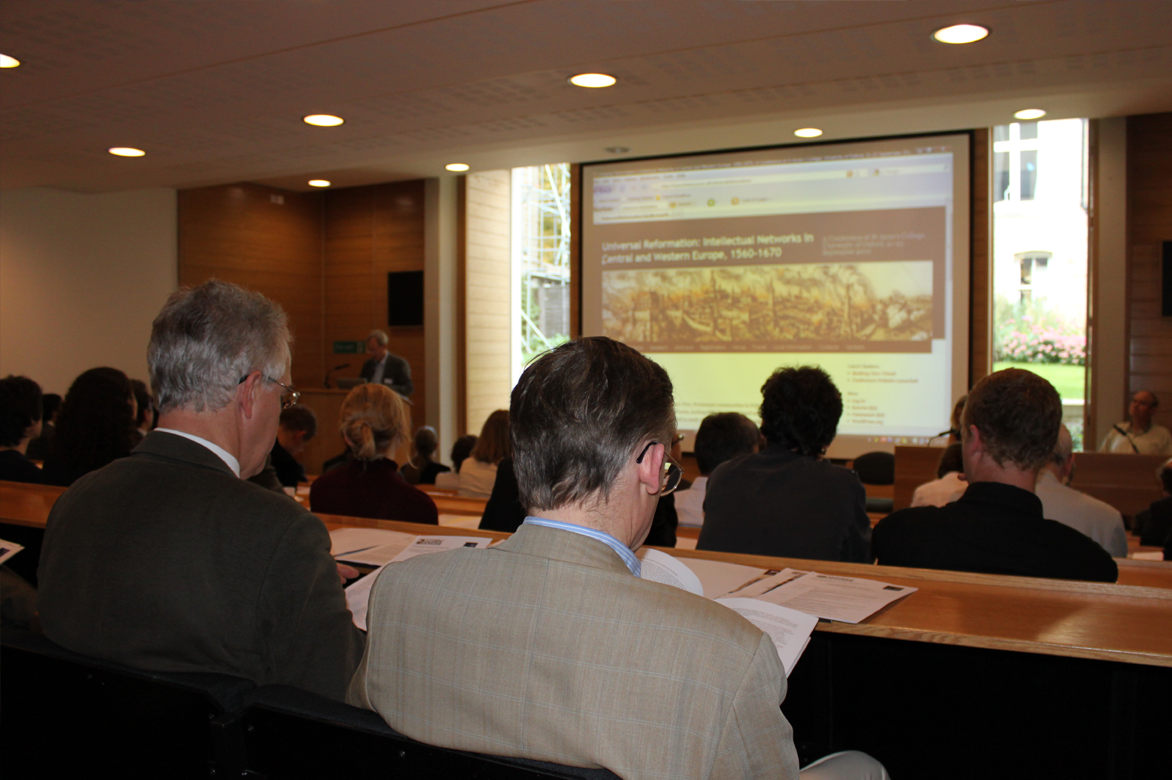
The opening plenary session.
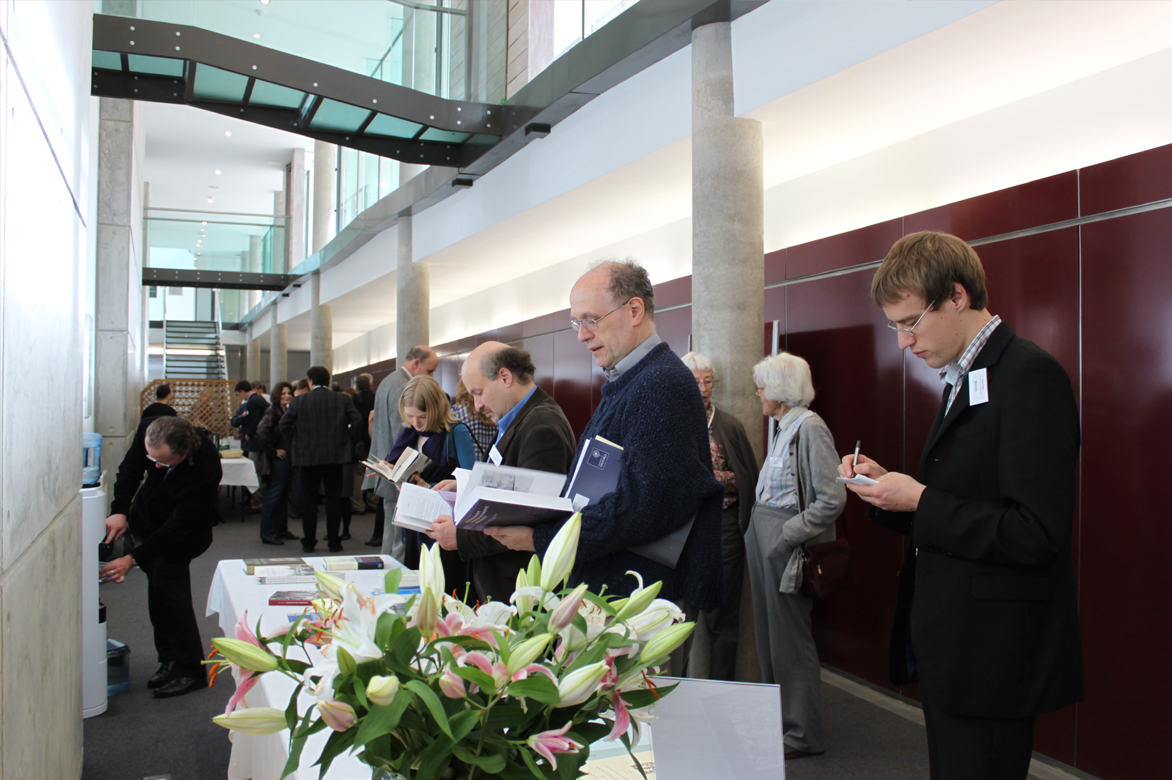
Relaxing in the foyer.
The Project’s inaugural conference, Universal Reformation: Intellectual Networks in Central and Western Europe, 1560-1670, took place at St Anne’s College on 21–23 September 2010. The event, which was attended by over ninety delegates, built on three preparatory European workshops (held in Prague, Cracow, and Budapest), and allowed forty-two emerging and established scholars from eleven countries to share their perspectives on the international networks and intellectual traditions brought into being by the upheavals of the Thirty Years War. Themes explored included institutional networks and intellectual exchange, encyclopaedia and pansophia, the early modern European media revolution, ecclesiastical reconciliation, and millenarianism, prophecy, and propaganda. Delegates also enjoyed a drinks reception in the Bodleian Library‘s historic Divinity School (incorporating a private viewing of the exhibition ‘My Wit was Always Working’: John Aubrey and the Development of Experimental Science), and were present for the prototype launch of our union catalogue. For further information, including speaker profiles and abstracts, please visit the conference microsite; for details of our 2011 event, please visit the conference webpage.
James Brown
July 14, 2010
Conferences and Workshops, Events, Project Updates
Tags: Communication, Databases, Digitization, Europe, History of Science, Networks, Royal Society, Samuel Hartlib, Seventeenth Century, Union Catalogue
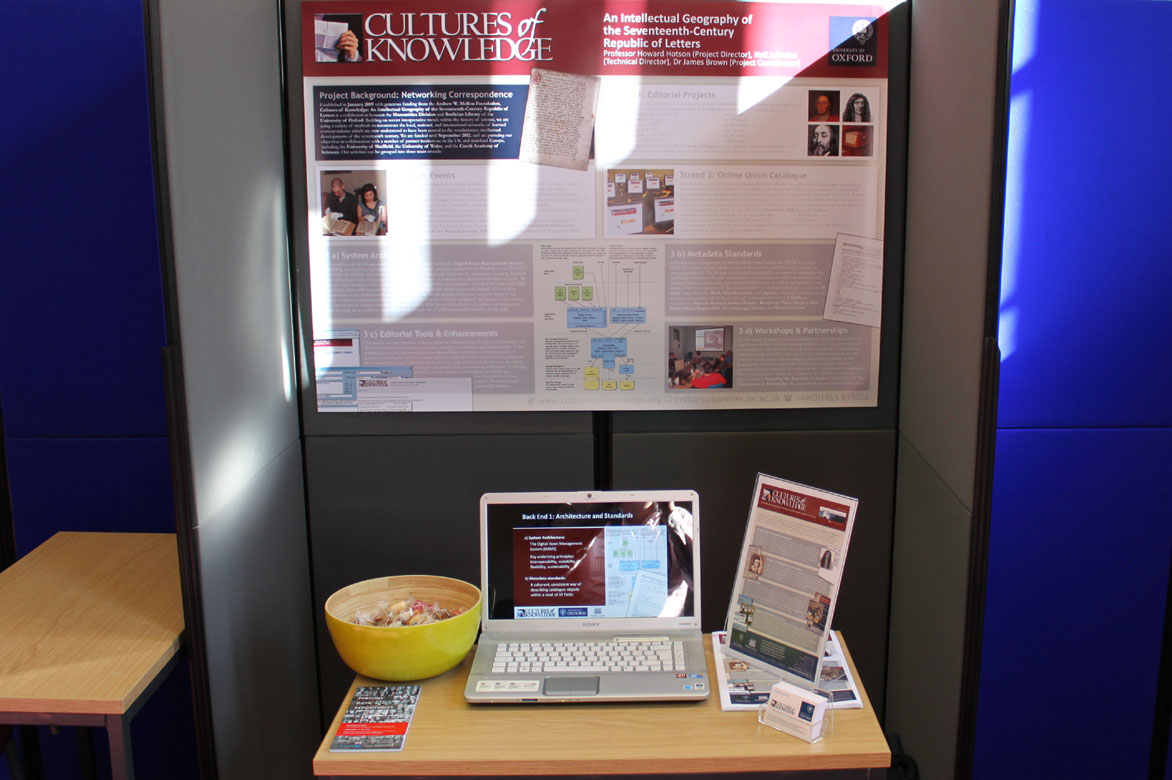
Our poster and stand at DH2010.
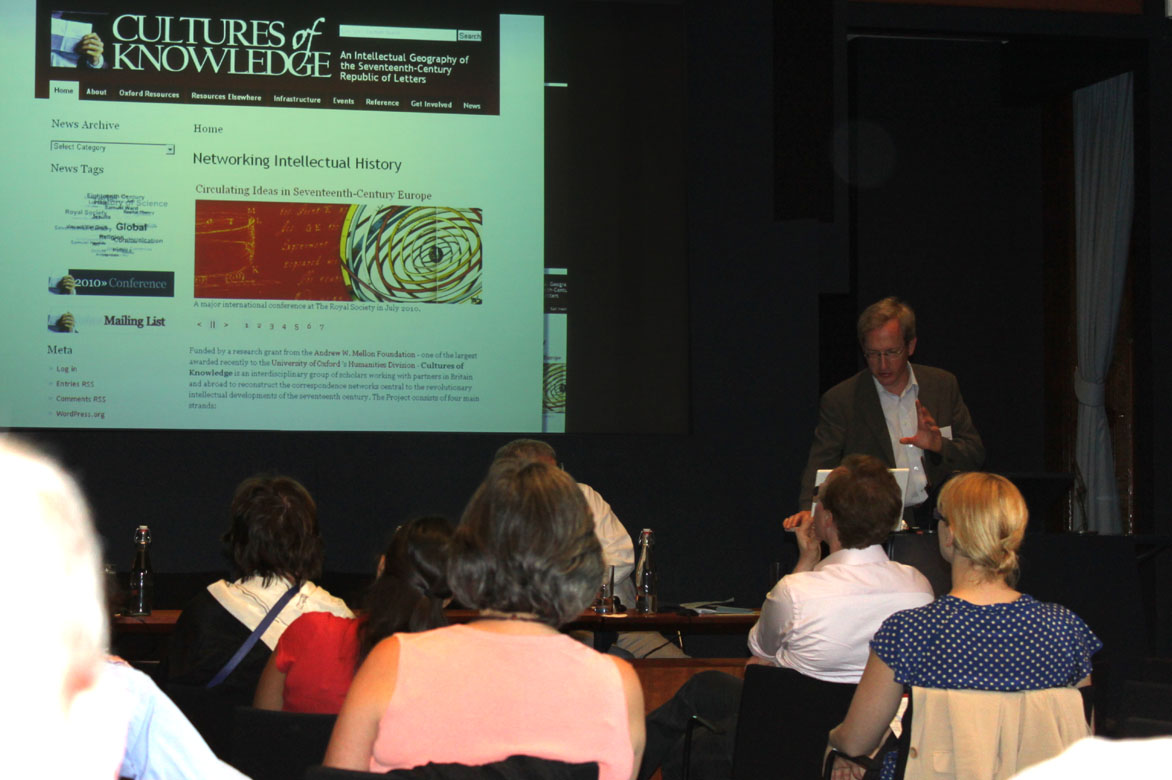
Presenting at the Royal Society.
Cultures of Knowledge headed to London last weekend as the Project Director and Coordinator braved thirty-degree metropolitan temperatures to share the Project’s research at two events. At Digital Humanities 2010, the flagship annual meeting of the digital humanities community hosted this year by King’s College London, we presented a poster, which focused mainly on our union catalogue and its technical underpinnings. We received very useful feedback and discovered and made connections with some highly complementary projects, including the initiative discussed below. Meanwhile, at the kind invitation of our collaborator Mark Greengrass, Howard Hotson co-delivered a keynote address at Circulating Ideas in Seventeenth-Century Europe: Networks, Knowledge, and Forms, a conference at the Royal Society organised by Ruth Connolly (University of Newcastle), Felicity Henderson (Royal Society), and Carol Pal (Bennington College). Building on Mark’s overview of Hartlib’s significance as an intelligencer and the trials and tribulations of the Hartlib Papers Project, Howard used a description of the place of Hartlib and his letters within Cultures of Knowledge as the basis for a more general overview of the Project and its aspirations, especially within the digital sphere.
Download the poster presented at DH2010
Updated to include confirmed speakers and link to full CFP

Papers are invited for a conference on ‘The Global Dimensions of European Knowledge, 1450-1700’, which will take place at Birkbeck, University of London on 24-5 June 2011. The conference will investigate the impact of European exploration and travel on the structures, contents and sources of authority of European knowledge c.1450-1700, seeking to explore connections between the making of knowledge and a broad range of intellectual, political, cultural, religious and mercantile encounters between Europe and the wider world. It aims to bring together scholars from different disciplines working on any aspect of European knowledge that included an extra-European dimension. Forms of knowledge under consideration include ethnology, natural history, botany, natural philosophy, geography, cartography, medicine and chronology. Confirmed speakers include Professor Felipe Fernández-Armesto (Notre Dame), Professor Pamela Smith (Columbia), Dr Joan-Pau Rubiés (London School of Economics), Professor Ricardo Padrón (Virginia), Professor Nicolás Wey-Gómez (Brown), Dr Michiel van Groesen (Amsterdam), and Professor Peter Burke (Cambridge). The deadline for proposals is 31 July 2010; for further details and submission instructions, see the full call for papers.
 Further to the CFP (which is now closed), full details are now available for the conference The Global Dimensions of European Knowledge, 1450-1700, which will take place at Birkbeck, University of London on 24–25 June 2011. The conference will investigate the impact of European exploration and travel on the structures, contents and sources of authority of European knowledge c.1450-1700, seeking to explore connections between the making of knowledge and a broad range of intellectual, political, cultural, religious and mercantile encounters between Europe and the wider world. For keynotes, panels, abstracts, and speaker biographies, please visit the conference website.
Further to the CFP (which is now closed), full details are now available for the conference The Global Dimensions of European Knowledge, 1450-1700, which will take place at Birkbeck, University of London on 24–25 June 2011. The conference will investigate the impact of European exploration and travel on the structures, contents and sources of authority of European knowledge c.1450-1700, seeking to explore connections between the making of knowledge and a broad range of intellectual, political, cultural, religious and mercantile encounters between Europe and the wider world. For keynotes, panels, abstracts, and speaker biographies, please visit the conference website.


 A recent correspondence-related public lecture by our
A recent correspondence-related public lecture by our 





 Join
Join 